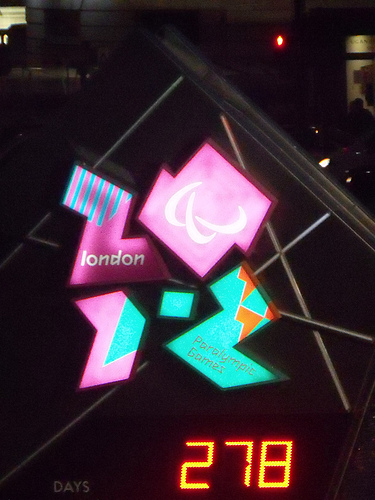


Picking up where we left off last week with a discussion about the 2012 Paralympic Games starting this Wednesday, and in particular the media coverage of the events that more than 4,2000 athletes with disabilities representing 166 countries will be participating in during their visit to London, England.
David Stringer’s Associated Press article, “Full TV coverage for Paralympics, just not in US,” is getting picked up by major newspapers here in America. While it may be too late in NBC’s planning for the petitioners he references to succeed in having live events broadcasted by the network, the resulting exposure has already achieved a larger goal for people with disabilities. It was best articulated by Richard Hawks, chief executive of the U.K. charitable organization, Scope, who tells Stinger that the Paralympics is “a catalyst to get people thinking and talking about disability and asking why we don’t see more disabled people in the media, in politics or in industry and what we can do about it.”
In England, the network known as Channel 4 has committed to 500 hours of Paralympics coverage across three stations and three online properties. Station officials tell reporter Mark Sweney of The Guardian that they expect to break even at best on their investment but the “brand and remit perspective made it the right thing to do.” What’s more, The Guardian’s Radio & TV blogger, Ben Dowell, offers this tidbit in his “Paralympics 2012 on TV: why you should be watching” post:
More than 50% of Channel 4’s presenting team are disabled, with the lineup including former Paralympic swimmer Rachael Latham, sports reporter and wheelchair baskeball player Jordan Jarret-Bryan and Martin Dougan, who came through the broadcaster’s presenter talent search scheme.
Indeed, Channel 4 has invested £600,000 in training people with disabilities to report on the Paralympic games, according to this story by James Hall of the London Telegraph, which features an incredibly cool photo of five of Great Britain’s athletes. Hall also says the network has developed a graphics system to better explain “why athletes whose disabilities often appear so different compete against one other.” An online version of The Sentinel called This is Staffordshire offers an amusingly written glimpse into the roles some of these people will play in a Paralympics countdown program called “Jon Snow’s Paralympic Show,” including this bit of must-see TV:
And Sue Kent, the only massage therapist in the UK qualified to ply her trade using only her feet, practises on former Olympic champion and Channel 4 Paralympic sports presenter Jonathan Edwards before heading into the Paralympic village to look after the athletes.
Sue Kent’s career may warrant further investigation in future posts, especially if we can find people with disabilities stateside who are massage therapists. Share any thoughts you might have in the Comments section below.
Image by Elliot Brown.
Not immediately, no. The Orbit Tower has been opneed for the Olympics and Paralympic Games but the Olympic Park in which the Orbit is located, will then be closed for an extended period before reopening in 2013, with some parts not due until 2014. What the exact cost of Orbit Tower tickets will be then, has yet to be finalised.